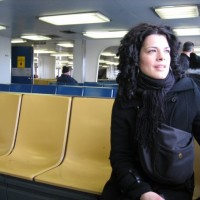Hello Dalí
“Surrealism is destructive, but it destroys only what it considers to be shackles limiting our vision” – Salvador Dalí
I want to talk to Dalí about his painting
tell him he paints a good egg
that it has the shape of all the eggs
and even though I wouldn’t hate him, if he told me
he sucked the yolk into his brush
because he wanted to keep the nutritious yellow
for something else, I want to tell him
I am concerned about those bodies –
hers and the one breaking through the shell.
I want to tell him that not all peckers are created equal
(as far as what came first, it is clear the body breaking through the shell
is not the father of the child between her legs) –
and that something more like a chicken
would have been better. She looks like she could use some food.
The language of vultures
“We have said that the duende loves the edge, the wound, and draws close to places where forms fuse in a yearning beyond visible expression” – Frederico Garcia Lorca
Give love
an opening –
a piece of flesh
in full flush
for love to circle
and peck and devour;
love is hungry
to the bone.
To the bone,
love speaks words
to yield the marrow;
to the bone, it speaks
the language of vultures.
The language of vultures
has one hundred words for decay;
each one sits decomposing
on love’s tongue
until all that remains
is the smell
of a pickled body.
come, sit, eat
this table, made of wood
is a place to take
a knife and fork to our sins
it is where wine is wine
blood is blood, bread is bread
and the body is the body
this table, made of wood
has legs like a dog, is weighed down
like a donkey, has the look of
a satisfied, proud lover
with meat in all the right places,
falling off the bone
this table, made of wood
is to this room
what the heart is to the body
the flat top is an open hand
extended in offering : come, sit, eat –
no one is going to ask for your head on a plate.
We live in a house made of knives
We started out with none. One day,
you brought me flowers and a knife –
to cut the stems, you said. I thought
it was the prettiest thing, awed by the
small effort needed for the slice.
Awed by my awe, you brought more
flowers – and with each bouquet,
another knife for me to cut the stems;
after all the flowers had died,
a stunning collection of knives remained.
We placed them on the table, let our guests
use them at dinner; when we could not untie
a knot, we used the knives to break the hold.
Each knife held the weight of us, until the day
they claimed us for themselves.
We live in a house made of knives;
the pupils of our eyes have grown
so sharp, they make tiny gashes
in our eyelids every time we blink.
In time, we will go blind.
The yoke
We took an island trip
to visit a church
where a burnt man
was put to rest.
For the sake of this man
cameras with flashes
and women wearing pants
were prohibited
from going inside.
When I was younger
a cousin placed a knife
in the fire and then,
to test the heat,
stuck the blade
flat to my skin.
I stopped eating
fried eggs:
the sound of
hot oil popping
the small bubbles of white
pulling the egg up
from the pan
the smell –
all of it was
too much
like skin
burning.
Whosoever says
the yoke is an easy thing to bear
is a liar.
We took an island trip
to visit a church
where a burnt man
was put to rest, made
a saint for his troubles.
I was given a skirt for mine.


